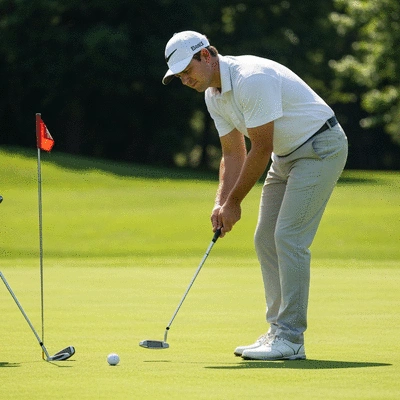Understanding Golf Swing Mechanics

Proper swing mechanics are more than just techniques; they form the bedrock of a successful golf game. By mastering these fundamentals, you can not only enhance your performance but also enjoy the game more deeply. Are you ready to unlock your full golfing potential?
What You Will Learn
- Understanding the significance of proper swing mechanics is vital for beginners to build confidence and improve performance.
- Key components like grip, stance, and posture play crucial roles in developing a successful golf swing.
- Focusing on technique enhances not only performance but also the overall enjoyment of the game.
- Mental preparation through visualization and focus can significantly impact shot execution and course management.
The Two Pillars of Golf Mastery: Physical Mechanics vs. Mental Game
Mastering golf involves both tangible swing mechanics and an intangible mental approach. Below is a comparison of these two crucial aspects.
Physical Mechanics: The Foundation
Focuses on the physical execution of the swing, crucial for consistency, distance, and injury prevention.
Key Components:
- Grip: Control and club interaction.
- Stance: Balance and setup.
- Posture: Body alignment.
- Swing Phases: Power generation.
Mental Game: The Edge
Focuses on psychological preparation, crucial for consistency under pressure and overall enjoyment.
Key Strategies:
- Focus: Eliminating distractions.
- Visualization: Picturing successful shots.
- Course Management: Strategic decision-making.
- Presence: Focusing on one shot at a time.
Understanding the Fundamentals of Golf Swing Mechanics
When it comes to golf, mastering the fundamentals of swing mechanics is essential. These mechanics serve as the backbone of your game, influencing everything from distance and accuracy to consistency during your rounds. As a golf enthusiast myself, I can't emphasize enough how understanding these basics can drastically improve your performance on the course!
Many beginners often underestimate the impact that proper swing mechanics can have. However, by focusing on these fundamentals, you set a solid foundation for your golfing journey. So, let's dive into why these mechanics matter and how they can elevate your game to new heights.

Why Proper Golf Swing Mechanics Matter for Beginners
For beginners, grasping the importance of swing mechanics is crucial. A solid swing not only leads to better shots but also builds confidence on the course. Here are a few reasons why you should prioritize understanding these fundamentals:
- Consistency: Proper mechanics enable you to hit the ball more consistently, reducing errant shots.
- Distance: A good swing can add significant distance to your shots, allowing you to reach greens in fewer strokes. Research from PMC NCBI highlights how kinetic sequence optimization, a key aspect of swing mechanics, directly correlates with increased club head velocity and driving distance.
- Avoiding Injury: Learning the correct techniques minimizes the risk of injury caused by improper form. Understanding the biomechanics of the golf swing, as discussed in another study from PMC NCBI, can help prevent common golf-related injuries.
With these benefits in mind, it's clear that investing time in learning the fundamentals of swing mechanics pays off in the long run. You'll be able to enjoy the game more and achieve the results you're aiming for!
Key Components of a Successful Golf Swing
A successful golf swing is a combination of various elements working in harmony. Let’s break down the key components that every golfer should focus on:
- Grip: Your grip influences how you control the club and hit the ball.
- Stance: The width and positioning of your feet set the stage for a balanced swing.
- Posture: Maintaining the right posture ensures that your body is aligned for an effective swing.
- Backswing and Downswing: Both phases are critical for generating power and making solid contact with the ball.
By understanding each of these components, you can start refining your swing mechanics. Remember, it’s all about creating a smooth and coordinated motion that feels natural for you!
The Role of Technique in Developing a Solid Golf Swing
Technique is the heart of any successful golf swing. It's not just about brute strength; rather, it’s about how effectively you can execute each movement. I often remind fellow golfers that focusing on technique will not only improve your performance but also enhance your enjoyment of the game.
To develop a solid swing, practice the following techniques:
- Focus on your grip: Ensure it's neither too tight nor too loose.
- Keep your stance balanced: You should feel stable and ready to swing.
- Maintain an athletic posture: Lean slightly forward with your knees flexed.
As you incorporate these techniques into your practice, you'll find that your swing becomes more fluid, allowing for better results on the course!
Breaking Down Each Phase of the Golf Swing for Beginners
Now that we've covered the fundamentals, let's delve deeper into the various phases of the golf swing. Each phase has its unique role in creating a successful shot, so understanding them is crucial for beginners.
In the following sections, we’ll break down these phases, providing you with practical tips to enhance your swing and make it truly your own.
Pro Tip
Did you know? Practicing your swing in front of a mirror can provide immediate feedback on your posture and mechanics. This visual reinforcement helps you make necessary adjustments on the fly, ultimately leading to a more consistent and effective swing. Next time you're at the range, take a moment to observe yourself; it could be the game-changer you need!
Frequently Asked Questions (FAQs)
Developing the Mental Game for a Better Swing
When it comes to golf, the mental game is just as crucial as the physical aspects of your swing. As I’ve discovered through my years of playing and writing about golf, being mentally prepared can make all the difference on the course. It’s not just about hitting the ball; it’s about how you approach each shot and the mindset you bring to your game.
In this section, we’ll explore techniques that can enhance your focus and visualization skills, as well as strategies for preparing mentally for each shot. By integrating these practices into your routine, you’ll see improvements not just in your swing but in your overall enjoyment of the game!

The Importance of Focus and Visualization
Have you ever noticed how some players seem to thrive under pressure? A lot of it comes down to their ability to maintain focus and visualize their shots. Visualization is a powerful tool that can help you picture your perfect swing before you even take the shot. When you can see the shot in your mind, it can translate to better execution on the course. Research from MIT emphasizes how mental models and visualization contribute to effective performance in complex tasks like golf.
- Start by closing your eyes and picturing the hole layout.
- Visualize each step: your stance, grip, backswing, and follow-through.
- Imagine the ball soaring through the air and landing exactly where you want it to.
This technique not only boosts your confidence but also helps create a more consistent approach to each swing. Remember, the best players aren’t just physically skilled; they’re mentally prepared as well!
Visualization Techniques to Enhance Your Swing Performance
To take your visualization practice a step further, try these specific techniques:
- **Pre-round visualization:** Spend a few moments before your round visualizing your best shots. This sets a positive tone for your game.
- **Post-shot reflection:** After each shot, reflect on what you visualized versus what actually happened. This helps fine-tune your mental approach.
- **Daily mental rehearsals:** Incorporate visualization into your daily routine, even when you’re not on the course. It can be as simple as imagining your swing while you’re relaxing at home.
By actively engaging your mind in this way, you create a deeper connection between your mental and physical game, paving the way for improved performance.
Preparing Mentally for Each Shot
Preparation is key to mastering the mental game of golf. Course management is an an essential part of this preparation. By making informed decisions about each shot, you can reduce pressure and increase your chances of success.
- **Assess the course:** Take time to analyze the layout and identify potential challenges before your round starts.
- **Plan your shots:** Think through each hole and decide on the best strategy for your game. This includes club selection and shot type.
- **Stay present:** Focus on one shot at a time. This helps to clear your mind of distractions and fosters a more relaxed state.
Implementing these strategies can greatly enhance your decision-making skills, helping you approach each shot with confidence and clarity. The more prepared you are mentally, the easier it becomes to execute your physical skills.
Recap of Key Points
Here is a quick recap of the important points discussed in the article:
- Importance of Swing Mechanics: Proper swing mechanics are essential for consistency, distance, and injury prevention in golf.
- Key Components: Focus on grip, stance, posture, and the phases of the swing (backswing and downswing) for a successful swing.
- Techniques for Improvement: Maintain a balanced stance, ensure a proper grip, and focus on athletic posture during your swing.
- Mental Game: Visualization and focus are critical for improving performance and reducing pressure on the course.
- Preparation: Assess the course and plan your shots to enhance your decision-making and confidence during play.









